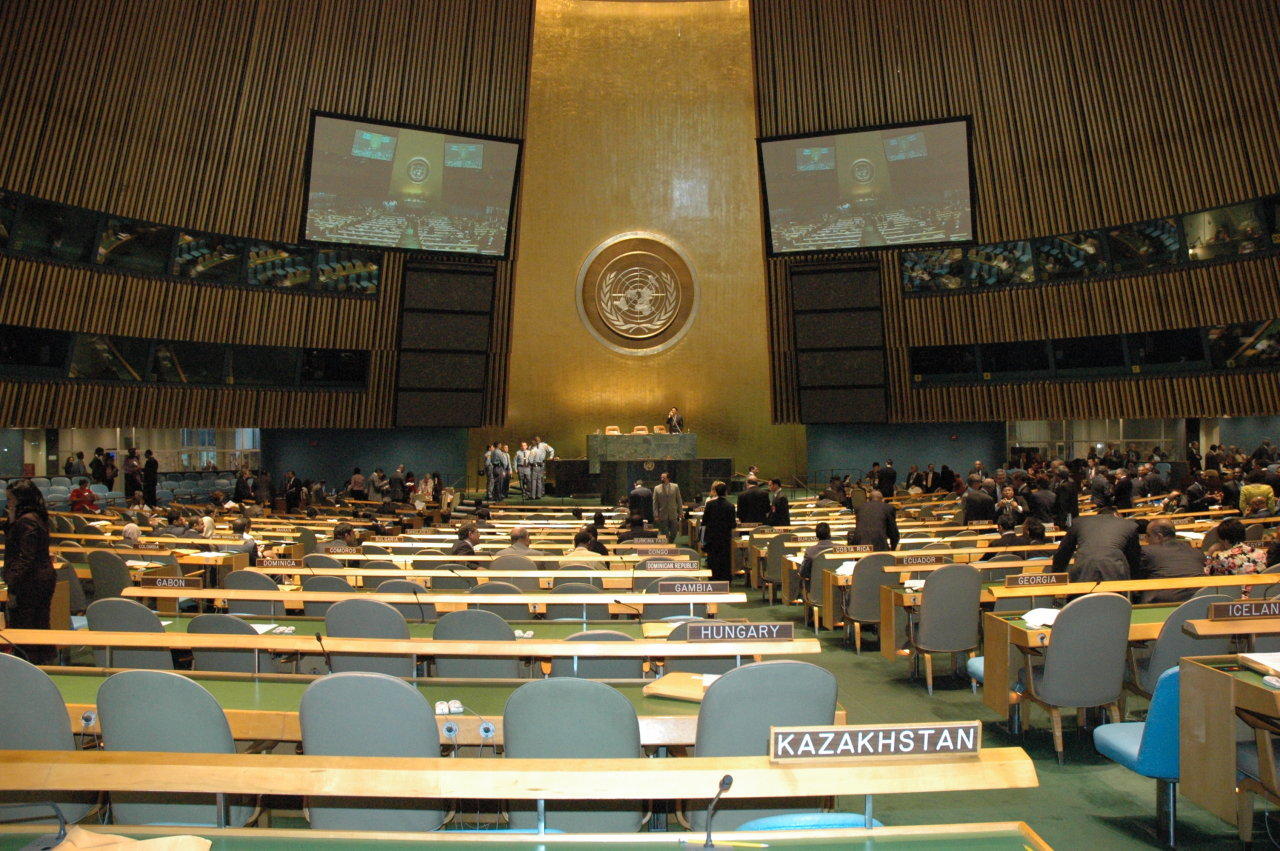Azerbaijan is home to tens of thousands of Armenians – statement at UNGA

By Trend
On Sept. 26, the Azerbaijani delegation at the General Debate of the 73rd session of the UN General Assembly made a statement in response to the speech of Armenian Prime Minister Nikol Pashinyan on the Armenia-Azerbaijan conflict and the Nagorno-Karabakh region of Azerbaijan, which has been occupied by Armenia since 1994, Azerbaijan’s Foreign Ministry said in a message Sept. 27.
“The initial impression is that the speaker, still under the influence of what he calls “Velvet revolution” and driven by populist and highly contradicting rhetoric, confused the General Assembly of the United Nations with the streets in Gyumri and Yerevan,” reads the statement.
“While the prime minister of Armenia was not fastidious in his choice of words to blame the ousted government of his country for authoritarian rule, corruption and suppression of democracy and human rights, his comments about the ongoing conflict between Armenia and Azerbaijan differed little from the phraseology that has been stubbornly used by his predecessors in the past,” the statement said. “As a result, the statement of the Armenian prime minister has become yet another useless attempt to deny the facts and responsibility for unleashing the war against Azerbaijan and its devastating consequences.”
“It is well-known that Armenia used military force to seize a part of the territory of Azerbaijan, including the Nagorno-Karabakh region, the seven adjacent districts and some exclaves, and to set up the subordinate racist minority regime there,” the Azerbaijani delegation said in its statement. “The war waged by Armenia claimed the lives of tens of thousands of people, ruined cities, towns and villages and resulted in the forcible expulsion of more than 1 million Azerbaijanis from their homes and properties, while thousands of people went missing in connection with the conflict.”
“The claims and misinterpretations that we have witnessed in the statement of the Armenian prime minister are particularly astonishing as they sound in the United Nations, whose Security Council adopted four resolutions, condemning the use of force against Azerbaijan and the bombardment and occupation of its territories and reaffirming respect for the sovereignty and territorial integrity of Azerbaijan, the inviolability of international borders and the inadmissibility of the use of force for the acquisition of territory,” reads the statement.
“Furthermore, in response to Armenia’s territorial claims and forcible actions, the Council reconfirmed that the Nagorno-Karabakh region is an integral part of Azerbaijan and demanded the immediate, complete and unconditional withdrawal of the occupying forces from all the occupied territories.”
“In other words, in the resolutions, the Security Council acknowledged the fact that acts of military force were committed against Azerbaijan; that such acts are unlawful and incompatible with the prohibition of the use of armed force in international relations and in contradiction with the Charter of the United Nations and its purposes; and that they constitute an obvious violation of the sovereignty and territorial integrity of Azerbaijan,” the statement said.
“No surprise that, in his speech, the prime minister of Armenia deliberately didn't mention the resolutions of the Security Council. He also omitted to mention other important international documents adopted in connection with the conflict.”
“The declared commitments and deeds of Armenia have always been at odds with the objective of the peaceful settlement of the conflict,” reads the statement. “The statement by the prime minister of Armenia is no exception. In reality, having used military force to occupy the territory of a sovereign state, Armenia has demonstrated its firm conviction in the existence of an alternative to a political solution.”
Allegations about a new mythical genocide threat against the Armenian people represent another falsehood, according to the statement.
“Unlike Armenia, which has implemented a policy of total ethnic cleansing of both its own territory and the occupied territories of Azerbaijan of all non-Armenians, Azerbaijan has preserved its ethnic and cultural diversity to the present day and is a home to tens of thousands of Armenians living in peace, harmony and dignity in the capital city of Baku and other parts of the country,” reads the statement.
“All statements by the Armenian leadership about democracy, human rights and the peaceful settlement of the conflict are preposterous and will remain mere words unless they are translated into real action that would put an end to the occupation of the territories of Azerbaijan and ensure the return of the forcibly displaced Azerbaijanis to their homes and properties in the Nagorno-Karabakh region and other occupied districts of Azerbaijan in safety and dignity.”
“The achievement of that objective, which is imperative and not compromise, will create the necessary conditions for addressing other issues with direct, equal and full participation of both communities of the Nagorno-Karabakh region within the constitutional and legal framework of Azerbaijan,” the statement said.
“Armenia’s annexationist and colonization policy has no chance of succeeding. The Nagorno-Karabakh region has always been and will remain an inseparable part of Azerbaijan. The military occupation of the territories of Azerbaijan is temporary and will never produce a political outcome desired by Armenia. Yerevan must drop its futile attempts to mislead its own people and the international community, engage constructively in the conflict settlement process and comply with its international obligations.”
The conflict between the two South Caucasus countries began in 1988 when Armenia made territorial claims against Azerbaijan. As a result of the ensuing war, in 1992 Armenian armed forces occupied 20 percent of Azerbaijan, including the Nagorno-Karabakh region and seven surrounding districts.
The 1994 ceasefire agreement was followed by peace negotiations. Armenia has not yet implemented four UN Security Council resolutions on withdrawal of its armed forces from the Nagorno-Karabakh and the surrounding districts.
---
Follow us on Twitter @AzerNewsAz
